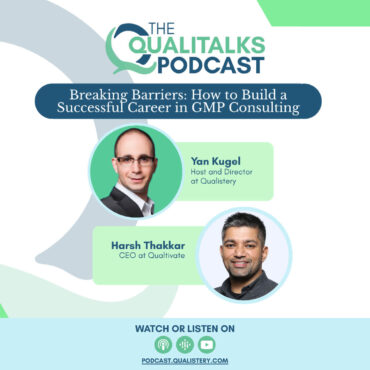
Proper time management is essential for every worker in the pharmaceutical industry because many of the processes have strict deadlines. Not finishing tasks on time may lead to non-compliance.
In this episode, Yan Kugel talked to Paul Palmer about time management tools and methods, which can help people complete their tasks much more efficiently and promptly.
Listening to the podcast and reading the article, you will learn:
- The reason why time management is important in pharma
- The principals of time management
- Important vs. Urgent Task Prioritization
- Tools to manage tasks and time
Note: Please click on highlighted words for more details about specific descriptions.
Time is really the only capital that any human being has, And the only thing he can’t afford to lose
– Thomas A. Edison
Time management is a vital part of every field. It helps us to complete the task/activity promptly, which requires the implementation of goals.
Time management is a combination of processes, tools, techniques, and methods.
Table of Contents
The Reasons Why Excellent Time Management Is Important in Pharma
As we know, there are deadlines in pharmaceuticals, and every process has to be completed as per is the timeline.
One example is for such processes are CAPAs. CAPA (Corrective Action & Preventive Action) is a very lengthy and tedious procedure. It has multiple steps like Change Control and effectiveness check before its closure. Therefore, the process must be tracked and processed as efficiently as possible.
Besides the CAPAs, there are other processes that also require planning to complete with its deadlines like investigation, root cause analysis, qualification and validation procedures.
Therefore, without proper task management pharma companies may face severe compliance problems.
Principles of Time management
- Planning – Take a few minutes to plan your activities.
- Organize and Prioritize – During an enormous amount of work, organize your task based on its priority.
- Do one task at a time – Concentrate on just one thing at a time. -When we try to be multitasking, tasks at hand take more time, and we become less productive, so try to do one thing at a time.
- Avoid Distractions – Distractions happen, and it’s hard to avoid. First, identify internal or external distractions and pinpoint their cause like the use of social media, web browsers, and gossiping.
- Delegate – By delegating tasks to your teammates or colleagues who are capable enough to perform that task, it will free up some of your time that you can give to other activities.
- Learn to say “No.” – Being a “yes” man or woman does no good for anyone. It is perfectly OK to say “no” to tasks by which you feel overwhelmed.
- Make realistic schedules – Plan your schedule, it will help to focus on most prior activity.
- Avoid Procrastinating – Focus on work and don’t put off tasks that need to get done.
Important vs. Urgent
- Important Tasks:
These are the tasks that help advance long-term goals and complete serious projects. But important tasks are not always urgent, so we’re more likely to postpone them in favor of those that require our immediate attention.
- Urgent Tasks:
Those tasks require immediate attention: phone calls, meetings, tasks with tight deadlines, and other issues that need you to take action quickly.
As a standalone, those task categorization gave no meaning for time management. Only when you combine them, you can understand their priority and how much attention you should give them.
The Eisenhower matrix is a great tool to help you with decision making.

Tools to Manage Different Tasks
In today’s era, many tools help us manage our schedule, and with the help of smart devices, we can organize every task promptly.
Therefore, it is crucial to develop a system which includes writing your task/event/each day with different symbols
- Paperwork vs. digitalization
- Digital papers / electronic notebook
- Also, you can also use various personal planning tools to organize your schedule. These tools include calendars, notebooks, electronic planners, pocket diaries, and index cards.
In conclusion, list all your tasks and schedules so that you can focus on your priorities in your planning tool.
Tips for Time Management
- Plan ahead
- Set Priorities
- Set time realistically
- Prioritize short task/long task
- Block your emails for a specific period
- Communicate with others- It helps to exchange information and ideas which help to complete the task or activity.






